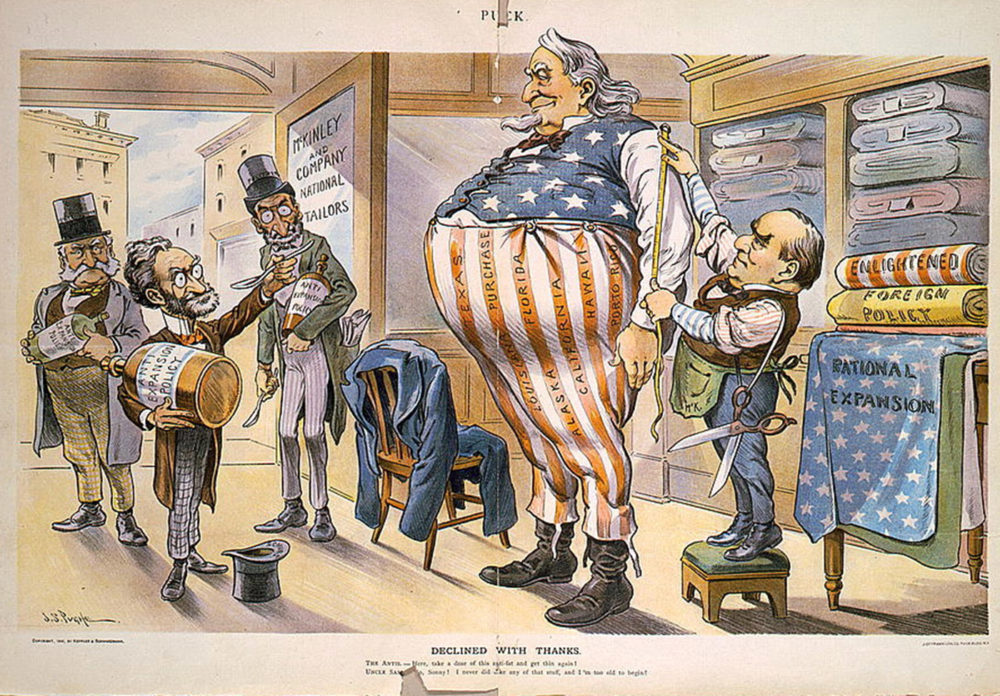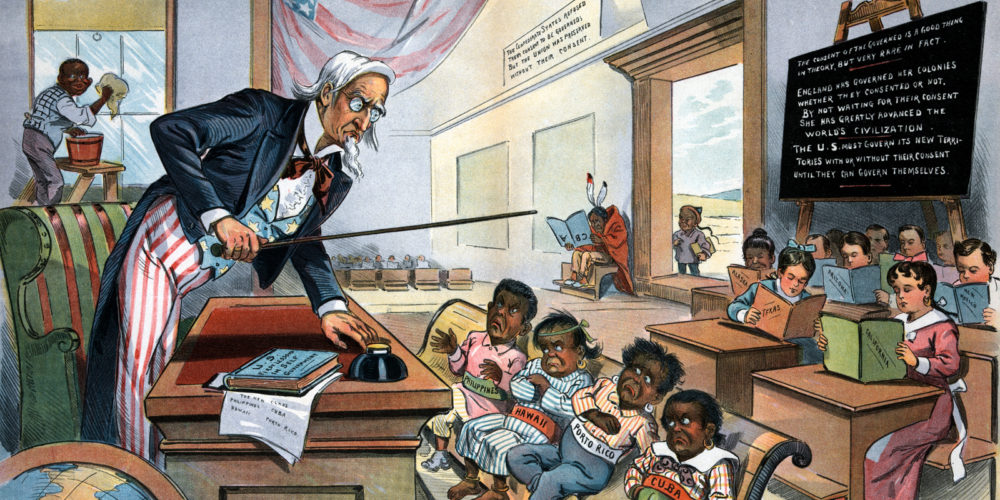Introduction
In the decades after the American Civil War, the United States exerted itself in the service of American interests around the world. In the Pacific, Latin America, and the Middle East, and most explicitly in the Spanish-American War and under the foreign policy of Theodore Roosevelt and William Howard Taft, the United States expanded upon a long history of exploration, trade, and cultural exchange to practice something that looked remarkably like empire. Meanwhile, as the United States asserted itself abroad, it received ever more numbers of foreign peoples at home. European and Asian immigrants poured into the United States. In a sense, imperialism and immigration raised similar questions about American identity: who was an “American,” and who wasn’t? What were the nation’s obligations to foreign powers and foreign peoples? And how accessible—and how fluid—should American identity be for newcomers? Such questions confronted late-nineteenth-century Americans with unprecedented urgency, and the following sources attempt to shed light on how they were approached by contemporary Americans.
Documents
1. William McKinley on American Expanionism (1903)
After the surrender of the Spanish in the Spanish-American War, the United States assumed control of the Philippines and struggled to contain an anti-American insurgency.
2. Rudyard Kipling, “The White Man’s Burden” (1899)
As the United States waged war against Filipino insurgents, the British writer and poet Rudyard Kipling urged the Americans to take up “the white man’s burden.”
3. James D. Phelan, “Why the Chinese Should Be Excluded” (1901)
James D. Phelan, the mayor of San Francisco, penned the following article to drum up support for the extension of laws prohibiting Chinese immigration.
4. William James on “The Philippine Question” (1903)
Many Americans opposed imperialist actions. Here, the philosopher William James explains his opposition in the light of history.
5. Mark Twain, “The War Prayer” (ca.1904-5)
The American writer Mark Twain wrote the following satire in the glow of America’s imperial interventions.
6. Chinese Immigrants Confront Anti-Chinese Prejudice (1885, 1903)
Mary Tape, a Chinese immigrant mother, fought for her daughter, Mamie Tape, to integrate public schools in California. The case, Tape v. Hurley (1885), reached the California Supreme Court in 1885 and, despite a favorable ruling for Tape, the San Francisco Board of Education built a segregated Chinese school which Mamie Tape was forced to attend. In the following letter, Mary Tape protested the denial of her daughter’s entry to Spring Valley School; Lee Chew immigrated from China at the age of 16. He worked as a domestic servant for an American family in San Francisco, started a laundry business, and later ran an importing business in New York City. In the following passage, he attacked anti-Chinese prejudice in the United States.
7. African Americans Debate Enlistment (1898)
Thousands of African-American troops served in in the Spanish-American and Philippine-American Wars. Confronted with racial violence and discrimination at home, they did so with a mix of hope, skepticism, satisfaction, and disappointment. Here, the Indianapolis Freeman reports on recruiting efforts in Hartfod, Connecticut.
Media
School Begins (1899)
In this 1899 cartoon published, Uncle Sam lectures his new students: The Philippines, Hawaii, Puerto Rico, and, Cuba. Past and potentially future U.S. acquisitions fill the rest of the classroom.
“Declined With Thanks” (1900)

John S. Pughe, “Declined With Thanks,” in Puck (September 5, 1900). Wikimedia.
In this political cartoon, tailor President McKinley measures an obese Uncle Sam for larger clothing, while Anti-Expansionists like Joseph Pulitzer unsuccessfully offer Sam a weight-loss elixir. As the nation increased its imperialistic presence and mission, many like Pulitzer worried that America would grow too big for its own good.

